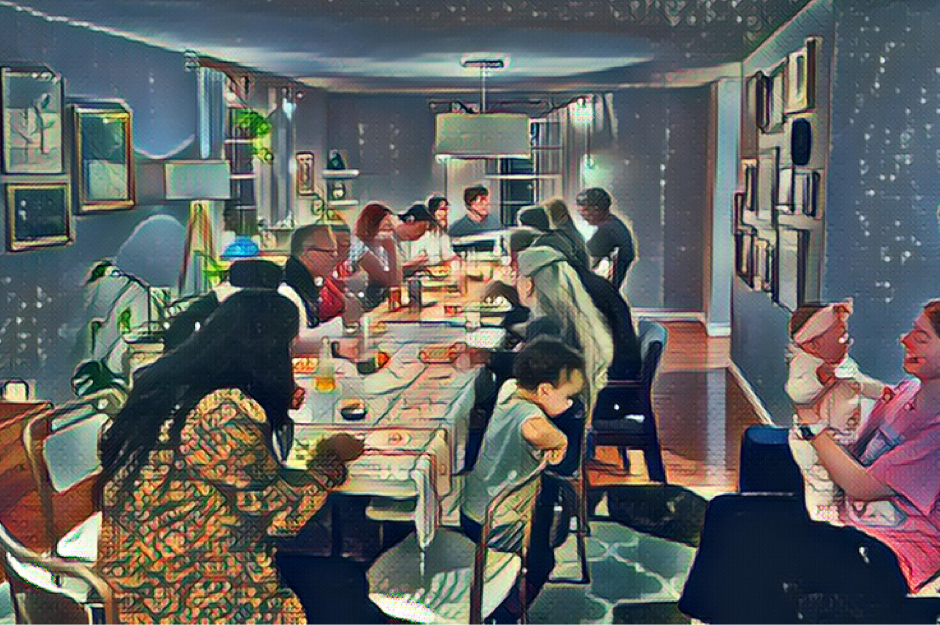Last Sunday, we talked about the Spirit-empowered community that is activated and graced with spiritual gifts. These rich and varied gifts are meant to function together as a body. The metaphor of the human body in I Corinthians 12 is a provocative critique of the individualism of church life today. Yet, we see that whenever the Spirit is poured out in renewal movements beginning with the first Pentecost and throughout church history, this type of Koinonia community emerges. Koinonia (κοινωνία) is the New Testament Greek word referring to shared community, fellowship, joint participation, and gifts jointly contributed. It is what happens when the Spirit indwells the beloved community.
"There was an intense sense of togetherness among all who believed; they shared all their material possessions in trust. They sold any possessions and goods that did not benefit the community and used the money to help everyone in need. They were unified as they worshiped at the temple day after day. In homes, they broke bread and shared meals with glad and generous hearts." (Acts 2:44-46)
Revival and reform movements throughout church history are accompanied by a return to primitive Christianity, social concern for the poor and the marginalized, generosity, sharing of resources, and egalitarian impulses that catalyze the "ordinary" person to contribute their gifts. When this happens, we know the Spirit is at work!
For this does not happen naturally. You know those people. You know yourself. We tend to be self-absorbed and myopically focused on meeting our own needs. Overwhelmed with the demands of life, we believe the lie that there is not enough. It is only by the Spirit of God that we are graced to live into another reality. When the community comes together to offer their gifts, there is always an abundance of riches. There is always more than enough.
The Story of Stone Soup
The Story of Stone Soup is an old, European folk tale that illuminates the power of community to move us from scarcity to abundance.
Once upon a time, there was a great famine in which people jealously hoarded whatever food they could find, hiding it even from their friends and neighbors. (Perhaps they hid their toilet paper too.) One day, a kindly-looking stranger came into a village and began asking questions as if he planned to stay for the night.
“There’s not a bite to eat in the whole province,” he was told. “Better keep moving on.”
“Oh, I have everything I need,” he said. “In fact, I was thinking of making some stone soup to share with all of you.” He pulled an iron cauldron from his wagon, filled it with water, and built a fire under it. Then, with great ceremony, he drew an ordinary-looking stone from a velvet bag and dropped it into the water.
By now, hearing the rumor of food, most of the villagers had come to the square or watched from their windows. As the stranger sniffed the “broth” and licked his lips in anticipation, hunger began to overcome their skepticism.
“Ahh,” the stranger said to himself rather loudly, “I do like a tasty stone soup. Of course, stone soup with cabbage — that’s hard to beat.”
Soon a villager approached hesitantly, holding a cabbage he’d retrieved from its hiding place and added it to the pot.
“Wonderful” cried the stranger. “You know, I once had stone soup with cabbage and a bit of salt beef as well, and it was fit for a king.”
The village butcher managed to find some salt beef . . . and so it went, through potatoes, onions, carrots, mushrooms, and so on, until there was indeed a delicious meal for all.
This is the power of the Koinonia community and offers a beautiful vision for spiritual gifts. The "magic" of the stone is the unquantifiable Spirit that transforms the ordinary into the sacred, turning a measly two fish and five loaves into a feast for 500. A carrot or onion on its own is a meager bite, but when offered to the collective pot of community, it becomes a delicious meal that nourishes all.
All Things Become Possible
The importance of the neighborhood comes front and center as one of the last vestiges of community today. I see a microcosm of this every week at our neighborhood dinners. Each one brings a bottle of wine, a plate of cookies, a green salad, some warm bread. But when it all comes together, it is a beautiful feast —and feast we do! This Tuesday was especially poignant as we had many new faces and our home overflowed with the abundance of goodness when 28 neighbors came together across different backgrounds, cultures, and stories. Carnitas and barbacoa were piled on warm corn tortillas with guacamole, fresh salsa, Mexican rice, beans, and cornbread. Longtime residents shared stories with new homeowners. Culinary artists delighted while the comics entertained. The young and energetic coddled the babies of tired and worn parents. The toddlers and the pups ran in circles buzzing with excitement. Everyone contributed, and everyone was filled. No one left hungry of stomach or heart.
This economy of the Spirit defies scarcity and breeds daring imagination. All things become possible. Small, motley groups of people become the instigators of big, beautiful dreams. Those on the margins of the neighborhood are pulled into the center. The unspectacular and overlooked become goldmines of hope. The most unlikely characters become creators of goodness and healing.
"Those who sign on and depart the system of anxious scarcity become the historymakers in the neighborhood." -Walter Brueggemann
If we are to live into a new imagination of what it means to be the church today, we desperately need the Spirit of God to move in our midst. We need to be filled again, emboldened, and empowered into radical generosity to offer our gifts to each other and to our neighbors in a world in which all things are now possible!
by Jessica Ketola

 RSS Feed
RSS Feed
